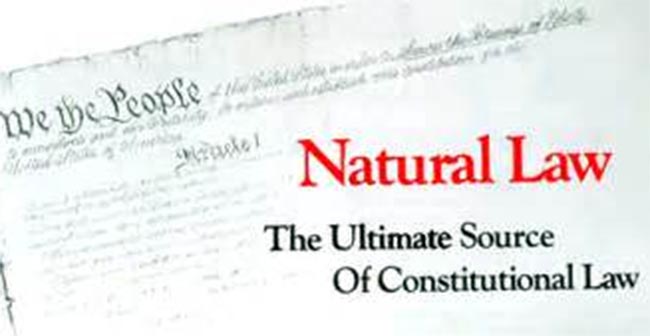Natural rights have been the issue of controversy from the time of Greek philosophers up to now. Initially, mankind was not considered equal in rights and freedoms, mainly from the viewpoint of Plato and Aristotle who believed that being slave or free is natural and inherent and there should be distinction between them.
Cicero believed that law is not the product of mankind but it has a divine root. According to him, the man-made law derives its legitimacy from the divine law and all mankind is equal in the eye of natural law.
Blessed Augustine talks about the City of God and Earthly City. The City of God is found in those individuals who possess real faith, whereas the Earthly City dominates in those who do not. Perhaps, the utopian society for him is found when a member of the City of God is in a position of authority. He states, “there is no happier situation for mankind, than that they, by God’s mercy, should wield power”. To cut short, Augustine distinguishes between the everlasting law and earthly law. Both lead to peace, however, the one peace, which derives from the everlasting law, is similarly everlasting. The other peace, which derives from the earthly law, similarly ends. According to him, a divine law is to be favored over an earthly one, and so, an everlasting peace. This is because following the divine laws lead to “life everlasting in peace”. He sought to paint the law with the brush of religious mindset. In short, he stressed on religious law rather than secular one.
Regarding the City of God, Saint Antony of Egypt said, “The City of God has its foundations in every place of human habitation. The kingdom of God is within. Goodness is within us and it needs only the human heart”.
Thomas Hobs and John Locke, whose theories had great influence over the modern law, believe that the main reason behind natural rights is fear of death and protecting nature. That is to say, man nurtured a strong emotion in protecting their lives and feared death in the state of nature, this bred the right to life and natural rights led to the establishment of natural law. In Hobbes’s opinion, the formation of society is the result of the confluence of the most powerful human emotions, namely, the fear of violent death and the most sacred right, that is, the right to safeguard the essence.
However, it is believed that a religious law will not be internationally agreed upon and might lead to controversial issues rather than bring peace and social order since there are many religions with conflicting tenets. That is to say, religious law be crucial within a society but not at a global level. For instance, the Universal Declaration of Human Rights (UDHR) has a secular root to avoid the bone of contention.
Natural rights are recognized in modern society both at national and international levels with modern concept. It is publicly believed that natural rights are inherent and inalienable rights which are not bestowed by the state but earned with birth. As it is stated in article 1 of the UDHR, “All human beings are born free and equal in dignity and rights. They are endowed with reason and conscience and should act towards one another in a spirit of brotherhood.” Hence, the fundamental rights i.e. the rights to life, liberty and property are natural rights as well as human dignity. No one, including the state, has the right to violate these rights or one’s dignity. However, based on “social contract”, people have agreed to have their rights restricted by the state so as to have them protected in return. Therefore, there are restrictions in natural rights and even executing one on the basis of law is allowed for establishing law and order in a society.
To sum up, it is believed that fear of death and tendency for self-defense, according to Hobs and Locke, are the main reason behind the establishment of natural rights. To protect natural rights, the states need to approve natural law. Secondly, although natural rights are not bestowed by governments, there are restrictions from the government to establish law and order in a society. So, natural rights are not absolute. The third issue is that approving law, be it rooted in religion or secularism, is to free the society from the state of nature and form a civil society, where the rights and dignity of mankind are protected and people live a peaceful and dignified life. Last but not least, despite the ideas of Greek Philosophers such as Plato and Aristotle, all humans are equal in rights and dignity on the basis of modern idea and international instruments and no one is born slave rather “all human beings are born free and equal in dignity and rights.”
Home » Opinion » The Root of Natural Rights
The Root of Natural Rights
| Hujjatullah Zia

